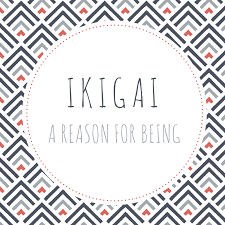Sunny Side Up – Ikigai

Ikigai—such an interesting word, right? Loosely translated as “a reason for being” in Japanese, ikigai is where passion, mission, vocation and profession all intersect. It’s another way of thinking about what drives us, what provides meaning. I heard about ikigai from a Ted Talk, and it brought to mind a conversation I had with a college student about what provides meaning in his life. After my talk with the Charlotte dad who offered his take on his shifting and evolving thoughts on what brought meaning to his life, I wanted to hear what a young person, just launching into adulthood, would think about meaning and purpose.
Frankly, his answers surprised me, and I struggled to shape his story. I knew there was something here, a thread that would tie it all together. I found that thread in ikigai.
“I want to be the best at what I do,” the young man told me, when I asked what provided purpose in his life. What kind of best? I wondered. Be the best because you are competitive and want to prove you’re better? No, no, he assured me. I don’t need to prove myself to anyone, but if I am going to do something, why would I not try to be the best at it?
I dove deeper. Why not just try your best? Why do you have to be the best?
My subject admitted he wanted to be remembered—he didn’t want to be a face in the crowd. “After I meet someone, I don’t want to get filed back in his brain. I want our interaction to be meaningful enough that when he hears my name again, he remembers me and our conversation. We only have one life. Why not make it count? And I want to do good—not well, but good. I want to improve quality of life for people by improving their physical health. I don’t need my work to be big, but I do want it to be important.” He explained that he hopes to improve methods of care for rehabilitation and training.
The conversation went on, but I had gotten what I needed. At first, I had a hard time defining what we were talking about and wasn’t sure how to write about it. Then, I happened upon the concept of ikigai, and it all fell into place.
Even at this age, ikigai is strong with this young man. He gets up in the morning with a defined sense of purpose: to improve himself and work hard to excel. It’s an honoring of his existence, a respect for the life he’s been given. At school he’s developing his mission to make life better for others, and this mission will help determine his vocation. A profession will stem from his vocation, and he’ll wake each day with renewed sense of purpose. There will be ebbs and flows and changes and adaptations, but right now, at 20 years old, this young adult is on the right path.
For so many of us, the passion of our lives is separate from the way we earn a living. Or maybe we embrace the passion and that becomes our profession, but we can’t actually make money at it. Neither of these scenarios offer ikigai, that blend of finding what you love, what you’re good at, what the world needs from you and what you can get paid for, that researchers think may actually help us lead longer, happier lives.
Finding ikigai can be a lifelong process, and it can change with time and circumstance. Have you found your ikigai? I’d love to write about you—anonymously if you choose.
Until next time, keep your sunny side up.

